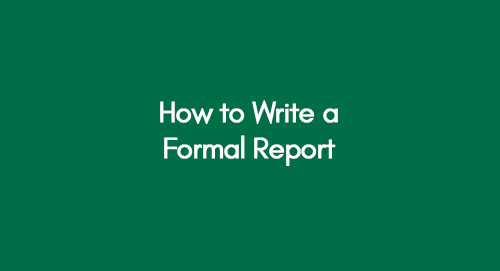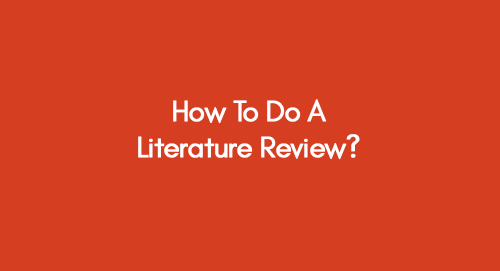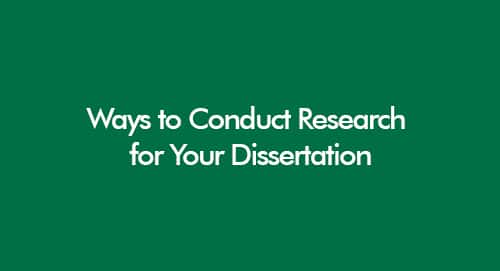
How to Write a Formal Report that Stands Out? | Best Practical Tips
October 17, 2022
How to Write a Personal Statement for Admission Application?
October 18, 2022A literature review showcases one’s understanding of existing scholarly works on a specific topic. It involves critically analyzing and synthesizing relevant sources to overview the subject matter comprehensively. By analyzing and synthesizing existing literature on a specific topic, a literature review plays a pivotal role in shaping the foundation and credibility of scholarly work.
Learn the Current Methods of Conducting a Literature Review
Explore New Dissertation Topics at Our Website
In the following sections, you will learn the best techniques and tips for how to do a literature review professionally.
Purpose of Literature Review
To place your research in the existing body of knowledge, you'll probably need to do a literature review while writing a dissertation, thesis, or research paper. The following explanation delineates the importance of a literature review:
Explore Current Examples of Dissertation Topics
1- Contextualizing the Research
A literature review helps establish the context for your research by placing it within the broader scholarly discourse. Reviewing relevant studies and theories situate your work within the existing knowledge landscape. This contextualization enables readers to understand the significance of your research and its contribution to the field.
2- Identifying Research Gaps
Through a comprehensive literature review, you can identify research gaps and unanswered questions in your field of study. Pinpointing areas requiring further exploration, you pave the way for future research endeavours. Identifying research gaps also demonstrates your understanding of the field and positions your work as a potential solution or advancement in the existing body of knowledge.
3- Building on Existing Knowledge
A literature review allows you to build on existing knowledge and theories. By examining the work of other researchers, you can identify seminal studies, theoretical frameworks, and conceptual models that form the basis of your research. This not only adds depth and credibility to your work but also acknowledges the contributions of previous scholars.
4- Evaluating Methodologies and Approaches
Through a literature review, you critically evaluate different methodologies and approaches employed in previous studies. This evaluation helps you select and justify the most appropriate research methodology for your own study. By learning from the strengths and limitations of previous research, you can enhance the rigour and validity of your own research design.
5- Providing a Comprehensive Overview
One of the primary functions of a literature review is to provide readers with a comprehensive overview of existing knowledge on a specific topic. By synthesizing and summarizing multiple sources, you present readers with a concise yet informative summary of the current state of research. This overview demonstrates your understanding of the subject matter and saves readers time by consolidating information from various sources.
6- Supporting Theoretical Frameworks
A literature review serves as a supporting pillar for the theoretical framework of your research. By reviewing relevant studies and theories, you can identify concepts and constructs that align with your research objectives. This alignment strengthens the theoretical underpinnings of your work and enhances its conceptual foundation.
Different Ways to Outline Literature Review
The literature review outline provides a structural framework for organizing and presenting the key elements of research work. Researchers can undertake different literature reviews depending on the research objectives and scope. Some common types include:
Learn to Write a Review Paper in the Easiest Way Possible
1- Thematic Outline
A thematic outline is a great way to organize your literature review if you know what themes or topics you want to focus on. To create a thematic outline, list all the themes or issues you wish to include in your literature review. Once you have your list of themes, you can begin looking for sources that discuss those themes.
2- Chronological Outline
You can create a chronological outline if you want to organize your literature review chronologically. List all the different sources in the order in which they were published. It can be a great way to see how other scholars have approached the same topic over time.
3- Methodological Outline
A methodological outline is a great way to organize your literature review if you want to focus on the different methods used to study a specific topic. To create a methodological outline, include all the other methods used to analyze your topic. Once you have your list of techniques, you can look for sources discussing those methods.
4- Conceptual Outline
You can create a conceptual outline focusing on the different concepts used to study a particular topic. You will need to list all the concepts used for the topic’s research. Once you have your list of concepts, you can begin looking for sources discussing those concepts.
How to Structure a Literature Review?
Here are some key steps to guide you on how to write a literature review effectively:
1- Define Your Research Question or Objective
Clarify the focus of your literature review. What specific research question are you trying to answer, or what objective are you aiming to achieve? This will help you determine the scope and boundaries of your review.
2- Conduct Thorough Research
Begin by conducting a comprehensive search for relevant literature using academic databases, scholarly journals, books, and reputable online sources. Ensure that your sources are current and reliable.
3- Organize Your Sources
Create a system to organize and manage your gathered sources. This can be done through reference management software or by creating an annotated bibliography.
4- Read and Analyze the Literature
Read each source carefully and critically evaluate its content. Look for key themes, concepts, methodologies, and findings that are relevant to your research question or objective. Take detailed notes, highlighting important points and relevant quotes.
5- Identify Gaps and Controversies
As you analyze the literature, identify any gaps, inconsistencies, or controversies in the existing research. This will help you position your own research and contribute to the academic discourse.
6- Develop a Structure
Plan the structure of your literature review. Decide on the main themes or sub-topics that will guide the organization of your review. Consider different approaches, such as chronological, thematic, or methodological.
7- Write Your Literature Review
Begin by writing an introduction that provides an overview of the topic, states your research question or objective, and explains the significance of the literature review. In the main body, present and discuss the key findings and arguments from the literature. Ensure a logical flow and coherence between paragraphs and sections. Include critical analysis, synthesis, and comparison of the sources.
8- Summarize and Synthesize
Summarize and synthesise each source's main findings and arguments to provide an overall understanding of the topic. Identify patterns, trends, and relationships among the sources.
9- Conclude Your Literature Review
Summarize the main points and findings from the literature, emphasizing their relevance to your research question or objective. Highlight any gaps or areas that require further investigation. End with a strong conclusion summarising the literature review's importance and implications.
10- Revise and Edit
Review your literature review for clarity, coherence, and accuracy. Ensure that you have properly cited all sources and formatted your review according to the required citation style.
Key Steps to Focus on for an Effective Literature Review
An effective literature review is written in five stages, which are as follows:
- Look up relevant writings
- Analyze the sources
- Determine the topics, arguments, and gaps.
- Explain the architecture
- Write a review of the literature.
To give a comprehensive picture of the current knowledge on the topic, a good literature review does more than describe the sources; it also analyses, synthesizes, and critically assesses them. The following two key elements must be kept in mind:
Narrow Down Your Focus
It is crucial to determine the focus of your literature review and narrow down your topic to ensure it is manageable and has enough existing research to draw from. Strike a balance between a topic that is not extensively researched, making it challenging to contribute new insights. Once your focus is established, initiate your literature search using various strategies. Conduct keyword searches in databases such as JSTOR or Google Scholar, or utilize advanced search operators like "AND" and "NOT" in Google to refine your results. Once you have located relevant sources, reading them attentively is key. However, mere reading won't suffice; meticulous note-taking is essential. Record the main arguments, influential authors or studies, and any noteworthy points from each source as you progress.
Evaluate the Sources for Your Research
When confronted with an overwhelming amount of literature on your subject, it becomes essential to prioritize and select the most pertinent sources for your research. As you evaluate each publication, consider crucial aspects such as the author's objective in addressing a particular problem or concern, the main ideas conveyed, and their significance. Assess the inclusion of significant concepts, theories, and methodologies, determining whether the study adheres to established paradigms or offers a novel approach. Examine the research's findings, recommendations, and how they align or challenge existing beliefs within the field. Evaluate the journal's credibility and its standing in comparison to other works. Additionally, be aware of the research's strengths and weaknesses. Strive to include reliable sources while also familiarizing yourself with seminal works and important theories in your field, ensuring a robust and informed literature review.
Get Help in Writing Literature Reviews from Experts
Conclusion
A literature review is essential to any research project, but writing one can be daunting if you've never done it before. This article will show you exactly how to write one—from choosing a focus and conducting your search to taking notes and writing up your findings. By following these simple steps, you'll be well on your way toward producing high-quality literature reviews that will contribute new insights into existing fields of study!
Explore the following topics to learn more about how to do a literature review.
- Learn How to Write Review Article: A Comprehensive Guide with Examples
- Literature Review: A Detailed Student Guide on How to Write a Literature Review
- How to Write a Dissertation Literature Review?
Contact Premier Dissertations to help craft the perfect literature review for your next academic paper.
Get 3+ Free Dissertation Topics within 24 hours?



























